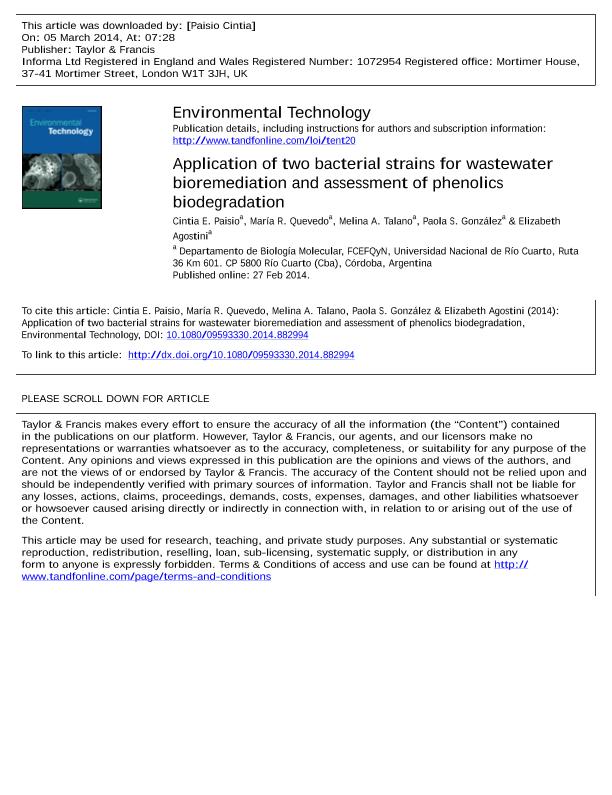Mostrar el registro sencillo del ítem
dc.contributor.author
Paisio, Cintia Elizabeth

dc.contributor.author
Quevedo, Maria del Rosario

dc.contributor.author
Talano, Melina Andrea

dc.contributor.author
González, Paola Solange

dc.contributor.author
Agostini, Elizabeth

dc.date.available
2018-01-17T18:02:37Z
dc.date.issued
2014-02
dc.identifier.citation
González, Paola Solange; Paisio, Cintia Elizabeth; Agostini, Elizabeth; Quevedo, Maria del Rosario; Talano, Melina Andrea; Application of two bacterial strains for wastewater bioremediation and assessment of phenolics biodegradation; Taylor & Francis Ltd; Environmental Technology; 35; 14; 2-2014; 1802-1810
dc.identifier.issn
0959-3330
dc.identifier.uri
http://hdl.handle.net/11336/33639
dc.description.abstract
The use of native bacteria is a useful strategy to decontaminate industrial effluents. In this work, two bacterial strains isolated from polluted environments constitutes a promising alternative since they were able to remove several phenolic compounds not only from synthetic solutions but also from effluents derived from a chemical industry and a tannery which are complex matrices. Acinetobacter sp. RTE1.4 showed ability to completely remove 2-methoxyphenol (1000 mg/L) while Rhodococcus sp. CS1 not only degrade the same concentration of this compound but also removed 4- chlorophenol, 2,4-dichlorophenol and pentachlorophenol with high efficiency. Moreover, both bacteria degraded phenols naturally present or even exogenously added at high concentrations in effluents from the chemical industry and a tannery in short time (up to 5 d). In addition, a significant reduction of biological oxygen demand and chemical oxygen demand values was achieved after 7 d of treatment for both effluents using Acinetobacter sp. RTE1.4 and Rhodococcus sp. CS1, respectively. These results showed that Acinetobacter sp. RTE1.4 and Rhodococcus sp. CS1 might be considered as useful biotechnological tools for an efficient treatment of different effluents, since they showed wide versatility to detoxify these complex matrices, even supplemented with high phenol concentrations.
dc.format
application/pdf
dc.language.iso
eng
dc.publisher
Taylor & Francis Ltd

dc.rights
info:eu-repo/semantics/openAccess
dc.rights.uri
https://creativecommons.org/licenses/by-nc-sa/2.5/ar/
dc.subject
Wastewater
dc.subject
Biotreatment
dc.subject
Phenolic Compounds
dc.subject
Bacteria
dc.subject
Bioremediation
dc.subject.classification
Bioremediación, Diagnóstico Biotecnológico en Gestión Medioambiental

dc.subject.classification
Biotecnología del Medio Ambiente

dc.subject.classification
INGENIERÍAS Y TECNOLOGÍAS

dc.title
Application of two bacterial strains for wastewater bioremediation and assessment of phenolics biodegradation
dc.type
info:eu-repo/semantics/article
dc.type
info:ar-repo/semantics/artículo
dc.type
info:eu-repo/semantics/publishedVersion
dc.date.updated
2018-01-17T15:02:56Z
dc.journal.volume
35
dc.journal.number
14
dc.journal.pagination
1802-1810
dc.journal.pais
Reino Unido

dc.journal.ciudad
Londres
dc.description.fil
Fil: Paisio, Cintia Elizabeth. Consejo Nacional de Investigaciones Científicas y Técnicas; Argentina. Universidad Nacional de Río Cuarto. Facultad de Ciencias Exactas Fisicoquímicas y Naturales. Departamento de Biología Molecular; Argentina
dc.description.fil
Fil: Quevedo, Maria del Rosario. Universidad Nacional de Río Cuarto. Facultad de Ciencias Exactas Fisicoquímicas y Naturales. Departamento de Biología Molecular; Argentina
dc.description.fil
Fil: Talano, Melina Andrea. Universidad Nacional de Río Cuarto. Facultad de Ciencias Exactas Fisicoquímicas y Naturales. Departamento de Biología Molecular; Argentina
dc.description.fil
Fil: González, Paola Solange. Consejo Nacional de Investigaciones Científicas y Técnicas; Argentina. Universidad Nacional de Río Cuarto. Facultad de Ciencias Exactas Fisicoquímicas y Naturales. Departamento de Biología Molecular; Argentina
dc.description.fil
Fil: Agostini, Elizabeth. Universidad Nacional de Río Cuarto. Facultad de Ciencias Exactas Fisicoquímicas y Naturales. Departamento de Biología Molecular; Argentina
dc.journal.title
Environmental Technology

dc.relation.alternativeid
info:eu-repo/semantics/altIdentifier/doi/http://dx.doi.org/10.1080/09593330.2014.882994
dc.relation.alternativeid
info:eu-repo/semantics/altIdentifier/url/http://www.tandfonline.com/doi/abs/10.1080/09593330.2014.882994
Archivos asociados
